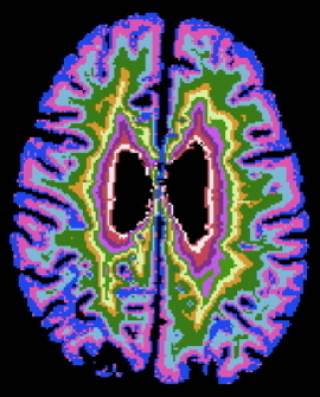Outside-in gradients in MS can be detected using MTR, and may reflect a pathological factor relevant to longer-term neurodegeneration and clinical outcomes.
Multiple sclerosis (MS) has long been thought of as mainly a disease of brain white matter (WM), and its most obvious clinical feature (a relapse) is attributable to the formation of new WM lesions. However, in the longer term, many people with MS develop irreversible progressive disability unrelated to relapses, and it is thought that ultimately neurodegeneration is the main cause of this. We do not know what the principal driver of neurodegeneration is in MS.
In a series of related studies we are:
- Investigating mechanisms underlying neurodegeneration in MS - funded by the MRC.
- Identifying MRI features that can predict the development of progressive MS (and conversely features associated with clinical stability) - funded by the MS Society.
Developing new MRI measures for use in remyelination (in collaboration with colleagues in Cambridge) and progressive MS trials - funded by the MS Society, International Progressive MS Alliance (a collaborative project, led by colleagues in Montreal, Canada), and Hoffmann-La Roche.
Featured PostDoc research fellow
Dr Ermelinda De Meo
I am a specialist in Neurology with a particular interest in understanding the pathogenesis of multiple sclerosis (MS) through the use of MRI.
I am focused on unravelling the heterogeneity of MS from both clinical and pathological perspectives by employing advanced statistical modelling.
Additionally, I have a keen interest in paediatric demyelinating diseases, as they offer a unique opportunity to understand the earliest changes occurring in MS. This understanding could ideally enable us to identify how to halt the chronic progression of the disease.
I am a Specialist Registrar in Neurology working between London and the East of England, with a specialist interest in neuroinflammation and multiple sclerosis (MS).
I currently provide NHS care in both general and MS clinics at the National Hospital for Neurology and Neurosurgery (NHNN), Queen Square (University College London Hospitals NHS Trust).
I am also a clinical research fellow currently undertaking my PhD studies at the Department of Neuroinflammation, Institute of Neurology, UCL, where I lead several research projects.
My research interests consider advanced magnetic resonance imaging (MRI) techniques and their clinical application in predicting disability progression in MS, exploring machine learning methods in quantifying inflammatory lesion and brain atrophy, and the development of clinical prognostic tools in predicting MS disease trajectory. I have a keen interest in medical education, and regularly teach clinical neurology to undergraduate medical students on the MBBS curriculum at UCL, as well as junior doctors and allied health professionals in the NHS setting, using a range of both lecture-based and bedside teaching methods.
Featured PostDoc research fellow
Dr Anna Combes
As a Research Fellow in the Department of Neuroinflammation, I work in a team using advanced MRI to investigate neurological disorders, particularly multiple sclerosis. My current projects include longitudinal studies of multiple sclerosis brain pathology using multi-modal MRI to better understand the mechanisms driving disease progression. I also collaborate with the Vanderbilt University Institute of Imaging Science (Nashville, USA) on developing methods for microstructural and functional imaging of the spinal cord.
Featured PhD student
Dr Nitin Sahi
I am a Neurology registrar, with a specialist interest in multiple sclerosis and neuroinflammation. Having started my clinical training in the West Midlands, I undertook a dedicated one-year clinical and research fellowship in multiple sclerosis at the National Hospital for Neurology and Neurosurgery. I am currently working as a clinical research fellow at the UCL Queen Square Institute of Neurology, where I am undertaking a PhD exploring the pathogenic mechanisms underpinning long-term disease progression in multiple sclerosis using MRI. In particular, my research focuses on genetic markers of disease severity and disability accrual as well as the long-term evolution and clinical significance of choroid plexus volume changes and surface-in gradients of pathology on MRI.
 Close
Close






